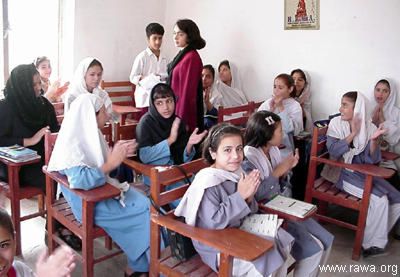By JASON STRAZIUSO, AP writer
KABUL, Afghanistan (AP) - The Taliban gunmen who murdered two teachers in eastern Afghanistan early Saturday were only following their rules: Teachers receive a warning, then a beating, and if they continue to teach must be killed.
The new list of 30 rules, decided on during a high Taliban meeting in September or October and since circulated over the Internet, span from the organizational - no jihad equipment may be used for personal means - to the health conscious - militants are not supposed to smoke.
They also contain a grave warning for aid workers and educators.
Rule No. 24 forbids anyone to work as a teacher "under the current puppet regime, because this strengthens the system of the infidels." One rule later, No. 25, says teachers who ignore Taliban warnings will be killed.
Taliban militants early Saturday broke into a house in the eastern province of Kunar, killing a family of five, including two sisters who were teachers.
The women had been warned in a letter to quit teaching, said Gulam Ullah Wekar, the provincial education director. Their mother, grandmother and a male relative were also slain in the attack.
The two sisters brought to 20 the number of teachers killed in Taliban attacks this year, said Education Ministry spokesman Zuhur Afghan. He said 198 schools have been burned down this year, up from about 150 last year.
The 30 Taliban rules also spell out opposition to development projects from aid organizations, including clinics, roads and schools.
"If a school fails a warning to close, it must be burned. But all religious books must be secured beforehand," rule No. 26 says.
An addendum to the rules said they were distributed initially at a meeting of top Taliban leaders during Ramadan this year. The rules were signed by Mullah Omar, the fugitive Taliban leader and "the highest leader of the Islamic Emirates of Afghanistan," according to the document.
A purported Taliban spokesman, Qari Yousef Ahmadi, confirmed the authenticity of the rules. He said aid organizations were not working for the Afghan people but for the policies of occupying countries. "If they won't stop their work we will target them, like we've targeted them in the past," he said.
Mohammad Hashim Mayar, the deputy direct of ACBAR - the Agency Coordinating Body for Afghan Relief - an oversight body for almost 100 aid organizations in Afghanistan, said the rules are no surprise.
"They've been practicing this in the past," Mayar said. "We already knew when they were burning schools, when they were killing people, we said that they were against education, and they are well aware of the importance of education."
The 46 year old schoolteacher tried to reassure his family that he would return safely. But his life was over, he was part-disembowelled and then torn apart with his arms and legs tied to motorbikes, the remains put on display as a warning to others against defying Taliban orders to stop educating girls.
Mr Halim was one of four teachers killed in rapid succession by the Islamists at Ghazni, a strategic point on the routes from Kabul.
The rules confirm a Taliban policy of undermining all forms of development that benefit ordinary Afghans and seem to sanction the targeting of civilians, said Maj. Luke Knittig, a spokesman for NATO's International Security Assistance Force.
"The rules likely represent an attempt at indirect leadership by the Taliban in the face of increasingly hindered ability to lead directly and visibly," said Knittig, who said officials had no reason to doubt the authenticity of the rules, which are being circulated on various Web sites.
Other edicts focus inward on the Taliban command structure:
- No. 9: Taliban may not use jihad equipment or property for personal ends.
- No. 10: Every Talib is accountable to his superiors in matters of money spending and equipment usage.
- No. 12: A group of mujahedeen may not take in mujahedeen from another group to increase their own power.
Other rules appear focused on not having ordinary Afghans turn against the Taliban. Rule No. 16 says it is "strictly forbidden" to search houses or confiscate weapons without a commander's permission. No. 17 says militants have no right to confiscate money or possessions from civilians.
No. 18 says fighters "should refrain from smoking cigarettes."
Rule 19 says that mujahedeen may not take young boys without facial hair onto the battlefield - or into their private quarters, an attempt to stamp out the sexual abuse of young boys, a problem that is widely known in southern Afghanistan but seldom discussed.
The rule regarding behavior toward young boys shows this has been a problem," Knittig said.
---
Associated Press reporter Nimatullah Karyab in Ghwando, Afghanistan, contributed to this report.




